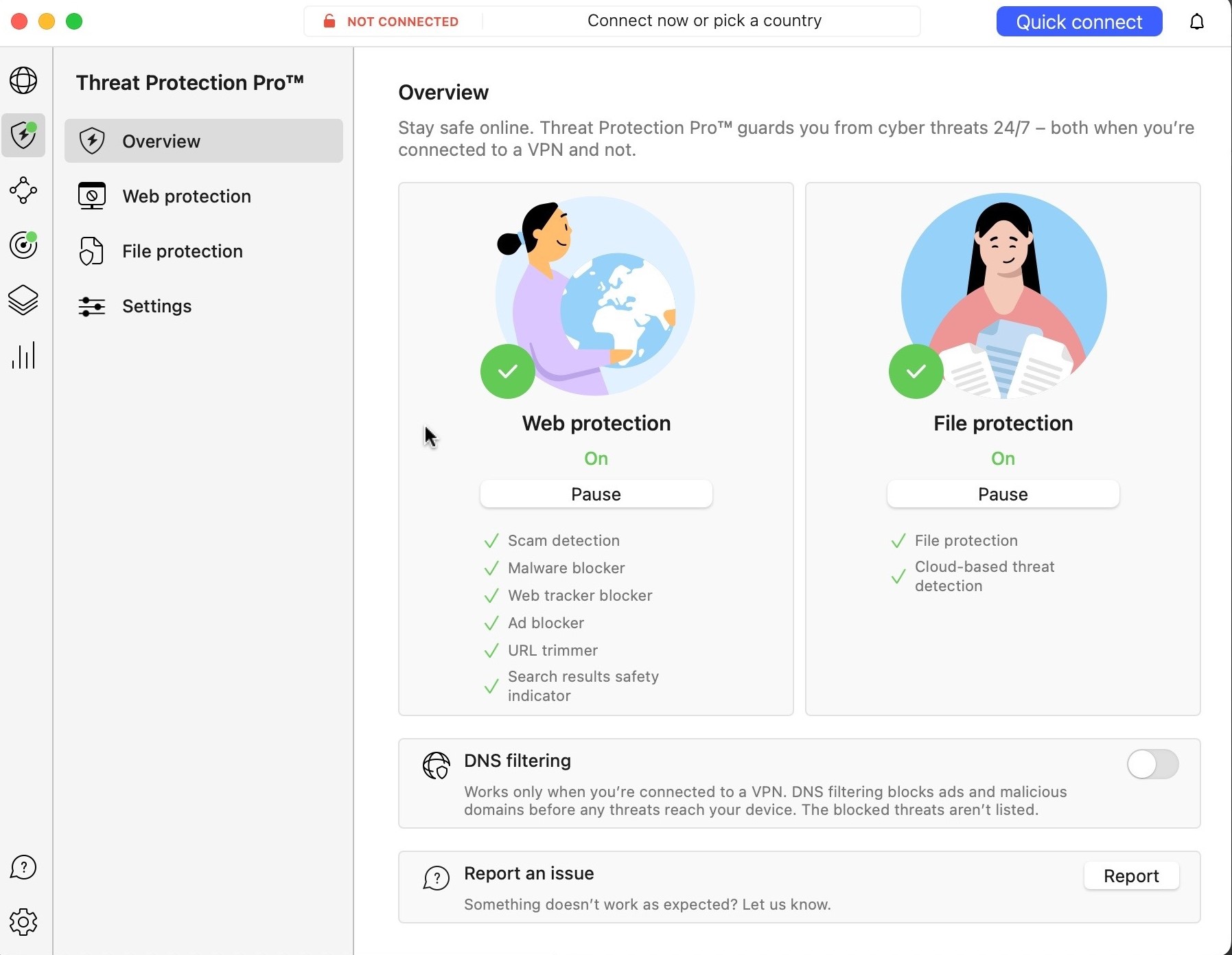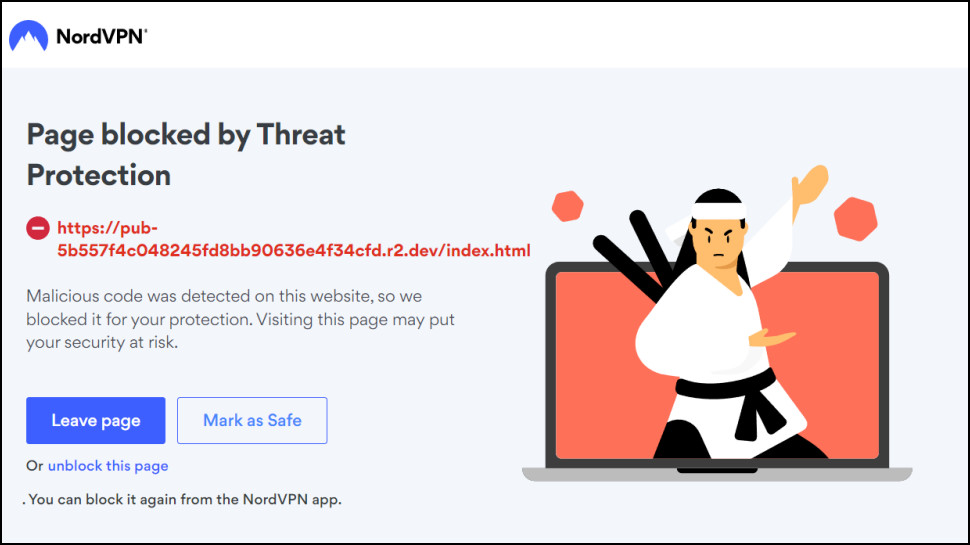Click here to visit Original posting
So, it's official – NordVPN is the top VPN we tested when it comes to blocking malware and phishing. The newly launched Threat Protection Pro was the winner. Yes, you'll need to pay an extra fee to use this tool, but our results clearly show that it's well worth it for your online security.
This may not come as a surprise as NordVPN recently revamped its tracker blocker offering to help users avoid falling victim to ever-growing phishing attempts and online scams. Nonetheless, we were really pleased to see Nord living up to its promises on this front.
All the best VPN services now have built-in ad, tracker, and malware-blocking tools. While the efficiency and convenience of these tools might be taken for granted by many - TechRadar's VPN reviews look to the core of the issue, and see just how much protection they give, and right now NordVPN is coming out on top.
How does NordVPN protect you against malware, phishing, and intrusive ads?
In June, NordVPN revamped its tracker blocker offering, and it now offers two tools: Threat Protection Pro and Threat Protection.
Threat Protection is what used to be called Threat Protection Lite and works as a DNS filter. This means it blocks harmful websites, trackers, and ads only on the domain level. Other VPN providers offer a similar service, including ExpressVPN and IPVanish. In all these cases, you must be connected to the VPN to benefit from these extra protections.
Threat Protection Pro promises to go even further and act more as an antivirus rather than an ad-blocker, working even without an active VPN connection. The Pro version works at the URL and Javascript levels to help you avoid tracking, phishing, scams, malware, and annoying ads. It also notifies you about potentially dangerous sites and zero-day phishing attempts before clicking on them, while blocking trackers and ads when you access a web page.
The big difference between the two versions you should keep in mind is availability. Threat Protection Pro is exclusive for Plus, Complete, Ultimate, and Ultra subscribers on Windows and macOS only. While, Threat Protection is available to all NordVPN customers using Android, iOS, Linux, Windows, macOS, and browser extensions.

How good is NordVPN blocking malware, phishing, and intrusive ads?
In August, NordVPN became the first VPN provider to rank among the top tools for avoiding online shopping scams. Its anti-phishing protection, Threat Protection Pro, was certified as the third-best tool out of 35 by the top independent lab AV-Comparatives.
Nonetheless, we decided to run our own tests and attempted to open 100 brand-new malicious URLs from anti-phishing experts OpenPhish. The results were very positive, with Threat Protection Pro blocking 87% of our sample threats. Only Bitdefender was fractionally better, blocking 89% of URLs in its own tests. Surfshark antivirus did really well, too, blocking 94% of phishing sites – but it's a standalone product rather than a VPN feature as is the case for Nord.
Something even more important: "NordVPN Threat Protection Pro was the only one showing any real impact against new phishing sites," said TechRadar Lead Security Reviewer, Mike Williams. Most DNS-level blockers could only catch them when they were over a week old, in fact. This is crucial considering that phishing sites don't generally last long, meaning most are new and may not last long enough to be picked up by other providers.
NordVPN was also the best against malware, dominating the results with 79% of malware threats blocked. Both Threat Protection and Threat Protection Pro were very efficient in blocking ads (84%), too, but the winner of this category was ExpressVPN instead with a brilliant result of 90% blocked ads.

Phishing attacks, malvertising incidents, and similar online scams are on the rise everywhere. As per NordVPN data, Threat Protection Pro reportedly blocked over 5 billion intrusive ads, almost 40 billion trackers, and 60 million malware infection attempts in May alone. People in the UK were the most affected amounting to over 18 million incidents since the beginning of the year. This is an average of 97 malware-related incidents per device per month, compared to the US median of 89 monthly attempts.
During the research period (January 1 and May 31), criminals heavily impersonated popular brands to trick victims into clicking phishing links and downloading infected files. Malicious Office365 (86K impersonated URLs discovered), Gazprom (60K), AT&T (28K), Facebook (19K), and Bet365 (15K) were the most used big names to spread malware.
You'll need to pay an extra fee, but our results clearly show it's worth it for your online security
What all these types of cyberattacks have in common is tricking people into clicking on malicious links through which criminals can inject malware software into their devices. Cybercriminals are increasingly executing well-crafted scams thanks to AI-powered tools, so it's very difficult now to spot red flags even for experts.
All this shows the growing need for tools like NordVPN Threat Protection Pro. Given how crucial it is to stay more anonymous online, a VPN (virtual private network) alone isn't enough to fight back all the modern threats you may face when you browse the web. This is exactly why many providers include a built-in blocking tool. Yet, not many can offer – as Nord Threat Protection Pro does – antivirus-like protection without having to download additional software.
As we mentioned earlier, Threat Protection Pro is no longer a basic feature, as you need to upgrade to a more expensive plan to benefit from its protection. If you are after only antivirus protection and don't want to put your hands in your wallet, I recommend checking out Avast Free. Remember, though, doing this means you won't have VPN protection.